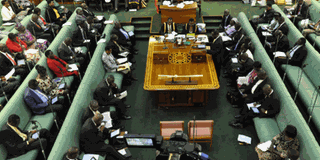Debates: Is Oulanyah winking in the dark?

Parliament in a recent session. Many critics think the quality of debate in Parliament is partly due to the large number of MPS. PHOTO BY GEOFFREY SSERUYANGE
What you need to know:
As Deputy Speaker decries the poor level of debate in the House, today we look at what solutions could be put in place to check this.
If an ambitious man winks at a pretty girl in the dark, can she see it? Is she ever going to know that the man has got the feelings for her? And what’s the point anyway?
Well, as Dr Stuart Henderson Britt, an award-winning Canadian critic, rightly puts it, if you ever tried this tactic, you certainly know what you’re doing, but nobody else does.
Dr Stuart’s narrative rhymes with the pluckiness of deputy Speaker Jacob Oulanyah. The criticism he normally gets, whenever things go wrong mainly because of what his boss, Speaker Rebecca Kadaga blamed on his “methods of work”, notwithstanding, Mr Oulanyah is not a ‘joking subject’.
He is courageous and on account of his “overbearing ways of doing things”, he is always the target of criticism.
Oulanyah has been labelled a ‘sycophant’ for siding with the government on controversial issues. For that matter, the MPs, including some ruling party members, abhor his methods of work.
But Oulanyah sometime last year went on KFM, a sister radio station to this newspaper, to tell his side of the story.
He told the country how Ms Kadaga sets him up to oversee the passing of controversial bills, a claim Kadaga dismissed with contempt and insisted that Oulanyah should blame himself.
In a sarcastic public letter to the Deputy Speaker, Aruu MP Odonga Otto, who at one time attempted to disorganise Oulanyah in his Omoro constituency, advised him [through the newspapers] to remove the log from his eye before removing grass from the eyes of [other] people.
But this has not stopped Oulanyah from raising serious issues. Last week, he lashed out at the new breed of well-paid mediocres in the House -- those who feed the country on shallow debates.
Oulanyah Vs Kadaga
Unlike his boss, Kadaga, who is ‘ambitious’ and a ‘populist’ who knows where is safest to jump in order to have things done without tumult in the house, Mr Oulanyah once in a blue moon talks to the press. And in spite of his icy relationship with some members, Oulanyah last week called a press conference to disparage the quality of people we send to Parliament.
Fresh from his official visit in Europe, Oulanyah warned that lack of research among MPs is seriously affecting the quality of debate in a “huge Parliament”.
Oulanyah’s concerns are not new but will help to revive the debate on whether the core constitutional function of the Legislature justifies its current size and composition.
Fortunately, people like Oulanyah understand what is at stake, particularly if we continue massaging a huge Parliament.
Oulanyah complained that many MPs are not knowledgeable about national issues such as the National Budget and legislation, blaming the pedestrian debates largely on lack of research.
He also indicated that the house is wasting a lot of time politicking instead of discussing issues that can address the urgent development needs of the country and that this explains why they prefer political discussions because they do not require a lot of input or research.
He told reporters how he stopped reading the Hansard, the official record of parliament, citing quality issues.
Indeed, the contributory factors in bringing about the present collapse of public respect for Parliament is the decline in the quality of debates and the consequent lack of adequate scrutiny of either legislation or the conduct of government has made matters worse.
Unfortunately, the coverage of Parliament in media is also shrinking – almost to vanishing point in some cases – and this is down to the lack of interest in day-to-day business shown by MPs themselves, demonstrated by the emptiness of the chamber during most debates and the generally poor quality of the speeches. They are simply not worth reporting.
Awkwardness in the House
Oulanyah laments how he had proposed that parties submit names of MPs who would be selected to speak to the Speaker in advance, an idea he said was rejected by Parliament’s Business Committee.
However, this couldn’t solve the problem. The only practical solution to the awkwardness in the House would come from MPs themselves, if they so wished.
For instance, since the current districts are the size of one county or two, each district should just have one MP. The savings would go to service delivery. But who is going to ensure this? As my people say, ‘a monkey can’t be a judge in a forest dispute’. Certainly, the MPs will not legislate themselves out of a job.
The other dilemma is that in the mist of our gutter politics, there are mainly two reasons why Oulanyah could be wink in the dark.
First, by questioning the quality of debate in a Parliament, where the ruling party has the majority, he either forgets or on purpose opts to disregard the President’s famous notion of an ideal MP - the one who sleeps through the debate and only wakes up to vote for the government position.
Secondly, the 1995 Constitution is categorical that for everyone to be elected to Parliament he or she needs a minimum requirement of A-Level or its equivalent, it does not require experience. Therefore, in this messy situation, expecting quality from the mob will be asking too much.




